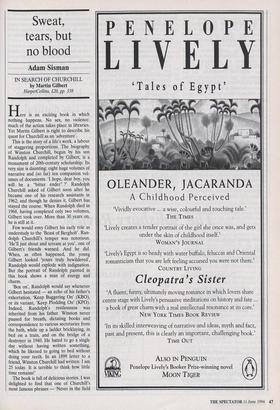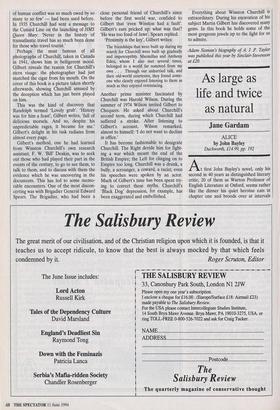Sweat, tears, but no blood
Adam Sisman
IN SEARCH OF CHURCHILL by Martin Gilbert HarperCollins, £20, pp. 338 Here is an exciting book in which nothing happens. No sex, no violence: much of the action takes place in libraries. Yet Martin Gilbert is right to describe his quest for Churchill as an 'adventure'.
This is the story of a life's work, a labour of staggering proportions. The biography of Winston Churchill, begun by his son Randolph and completed by Gilbert, is a monument of 20th-century scholarship. Its very size is daunting: eight huge volumes of narrative and (so far) ten companion vol- umes of documents. 'I hope, dear boy, you will be a "bitter ender" ?' Randolph Churchill asked of Gilbert soon after he became one of his research assistants in 1962; and though he denies it, Gilbert has stayed the course. When Randolph died in 1968, having completed only two volumes, Gilbert took over. More than 30 years on, he is still at it.
Few would envy Gilbert his early role as understudy to the 'Beast of Bergholt'. Ran- dolph Churchill's temper was notorious. 'He'll just shout and scream at you', one of Gilbert's friends warned. And he did. When, as often happened, the young Gilbert looked 'yours truly bewildered', Randolph would explode with indignation. But the portrait of Randolph painted in this book shows a man of energy and charm.
'Box on', Randolph would say whenever Gilbert hesitated — an echo of his father's exhortation, 'Keep Buggering On' (KBO), or its variant, 'Keep Plodding On' (KPO). Indeed, Randolph's restlessness was inherited from his father. Winston never paused for breath, dictating books and correspondence to various secretaries from the bath, while up a ladder bricklaying, in bed on a train, and on the bridge of a destroyer in 1940. He hated to go a single day without having written something, which he likened to going to bed without doing your teeth. In an 1899 letter to a friend, Winston Churchill had written: I am 25 today. It is terrible to think how little time remains!'
The book is full of delicious stories. I was delighted to find that one of Churchill's most famous phrases — 'Never in the field
of human conflict was so much owed by so many to so few' — had been used before. In 1935 Churchill had sent a message to the Cunard Line on the launching of HMS Queen Maly: 'Never in the history of transatlantic travel has so much been done for those who travel tourist.'
Perhaps the most famous of all photographs of Churchill, taken in Canada in 1941, shows him in belligerent mood. Gilbert reveals the reason for Churchill's stern visage: the photographer had just snatched the cigar from his mouth. On the cover of this book is a picture taken shortly afterwards, showing Churchill amused by the deception which has just been played on him.
This was the kind of discovery that Randolph termed 'Lovely grub'. 'History was for him a feast', Gilbert writes, 'full of delicious morsels. And so, despite his unpredictable rages, it became for me.' Gilbert's delight in his task radiates from almost every page.
Gilbert's method, one he had learned from Winston Churchill's own research assistant, F. W. 'Bill' Deakin, was to seek out those who had played their part in the events of the century, to go to see them, to talk to them, and to discuss with them the evidence which he was uncovering in the documents. This has led to some memo- rable encounters. One of the most discon- certing was with Brigadier General Edward Spears. The Brigadier, who had been a close personal friend of Churchill's since before the first world war, confided to Gilbert that 'even Winston had a fault'. Gilbert's ears pricked up: what was that? `He was too fond of Jews', Spears replied.
`Proximity is the key', Gilbert writes:
The friendships that were built up during my search for Churchill were built up gradually and imperceptibly. Macmillan and Anthony Eden, whom I also met several times, belonged to a world far removed from my own . . . Through our unhurried talk, and their old-world courtesies, they found some- one who clearly enjoyed listening to them as much as they enjoyed reminiscing.
Another prime minister fascinated by Churchill was Harold Wilson. During the summer of 1974 Wilson invited Gilbert to Chequers. He asked about Churchill's second term, during which Churchill had suffered a stroke. After listening to Gilbert's account, Wilson remarked, almost to himself: 'I do not want to decline in office.'
It has become fashionable to denigrate Churchill. The Right deride him for fight- ing a war which meant the end of the British Empire; the Left for clinging on to Empire too long. Churchill was a drunk, a bully, a scrounger, a coward, a racist; even his speeches were spoken by an actor. Much of Gilbert's time has been spent try- ing to correct these myths. Churchill's `Black Dog' depression, for example, has been exaggerated and embellished. Everything about Winston Churchill is extraordinary. During his excavation of his subject Martin Gilbert has discovered many gems. In this book he holds some of the most gorgeous jewels up to the light for us to admire.
Adam Sisman's biography of A. J .P. Taylor was published this year by Sinclair-Stevenson at £20.



































































 Previous page
Previous page